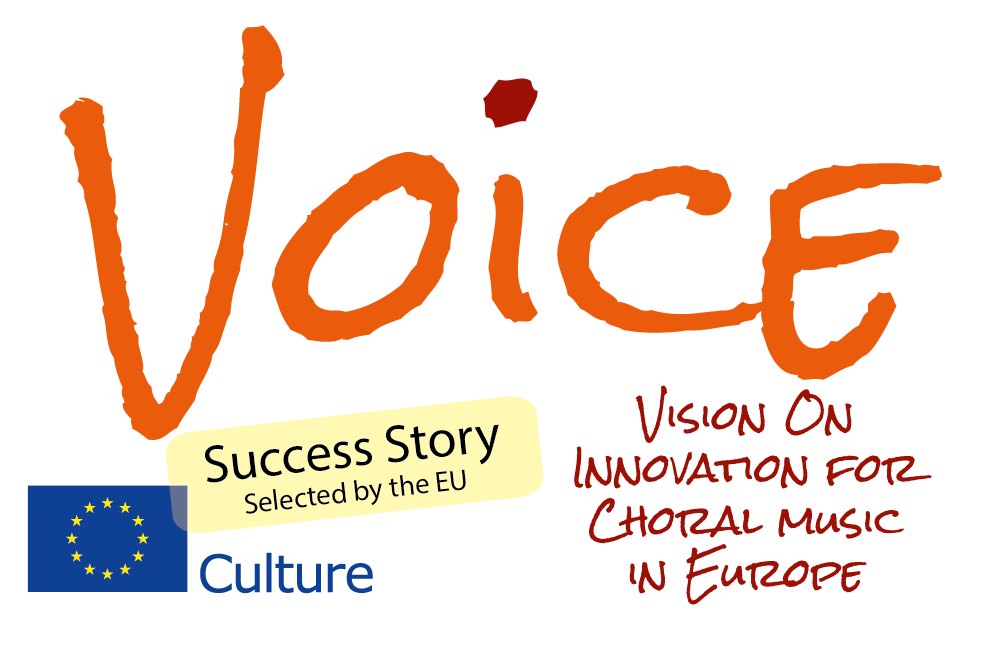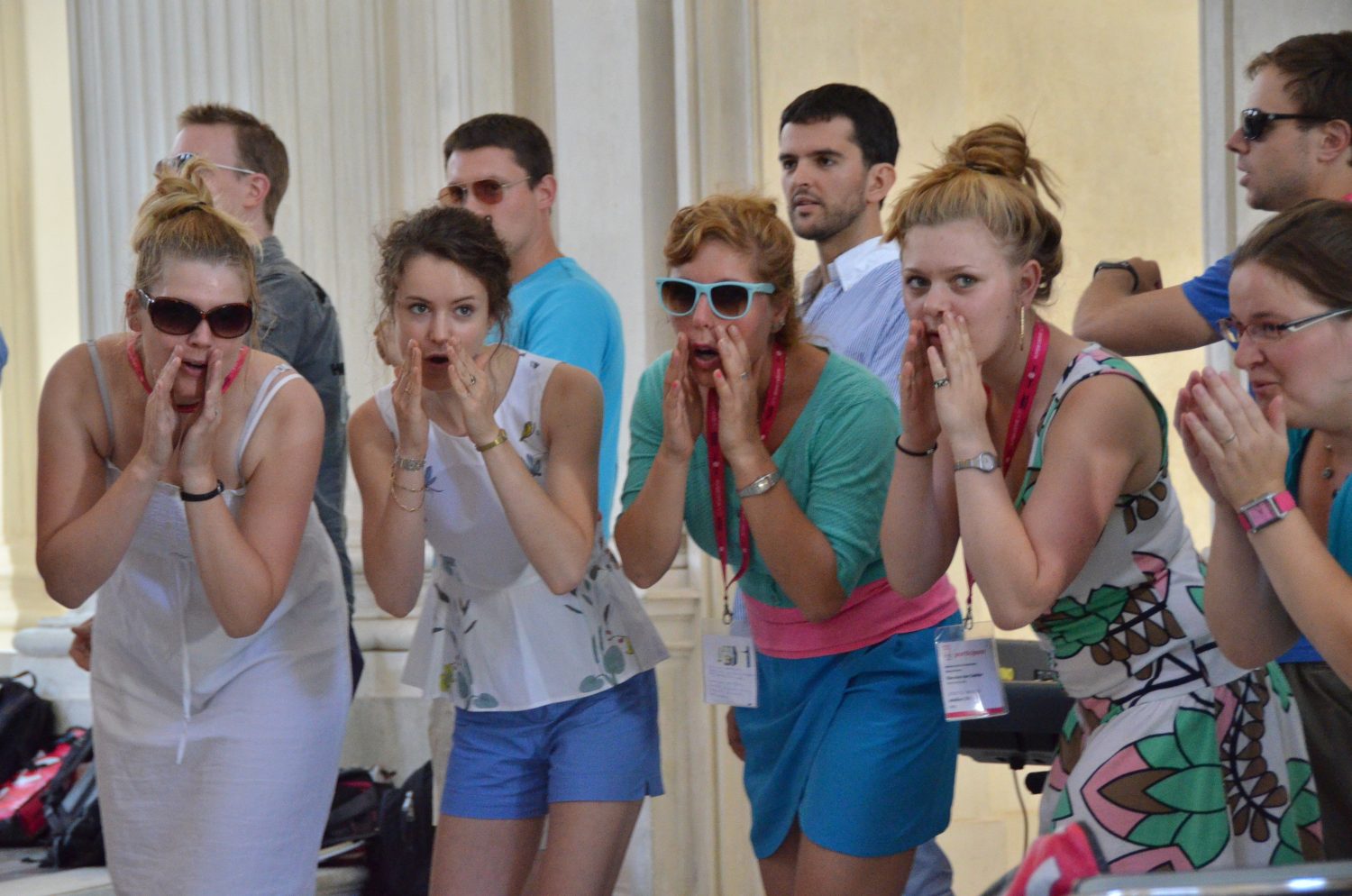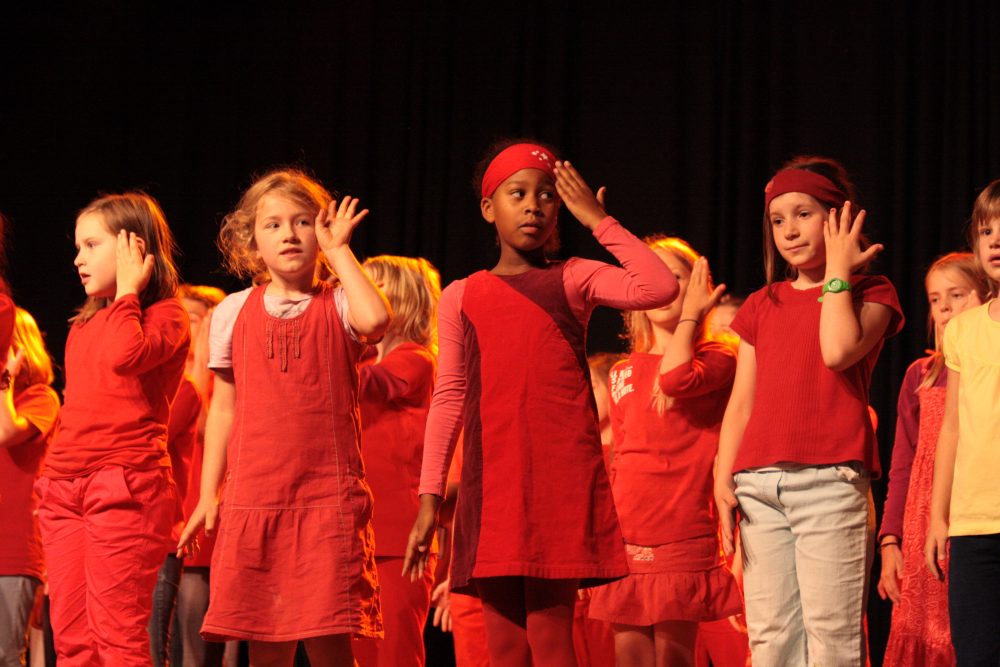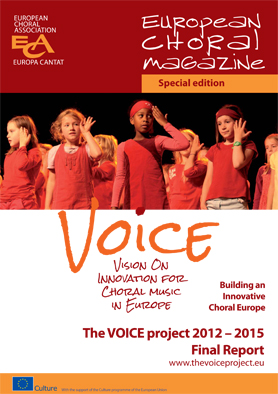the VOICE project

VOICE is a European project for the sustainable development and innovation of choral singing, a first-time major cooperation between choral operators, music educators and researchers. It is a joint effort of 15 coorganisers, spread over 11 countries.
The aims of VOICE are:
• to encourage new events and methods and the creation of innovative repertoire
• promote the voice as universal instrument
• improve the quality of vocal music
• enable transnational mobility and circulation of (young) musicians and choral works
• enhance the dialogue between cultures and generations as well as the exchange of expertise
• develop new tools for the promotion of singing in music education.
VOICE invests in research on the voice in partnership with universities and collect data on choral life in Europe. The 15 partners will spread the results to develop a new vision on choral singing in Europe.
The VOICE project is funded by the Culture Programme 2007-2013 of the European Union under the Strand 1.1 – Multi-annual
cooperation projects. http://eacea.ec.europa.eu This publication reflects the views only of the author, and the Commission cannot be held responsible for any use which may be made of the information contained therein.
Partners of the project
The VOICE project is a cooperation project coordinated by the
• European Choral Association – Europa Cantat (Germany) | www.europeanchoralassociation.org
in partnership with 14 coorganisers:
• Chorverband Österreich (Austria) | www.chorverband.at
• KU Leuven / Expertisecentrum Stem (Belgium) | www.med.kuleuven.be
• Koor&Stem (Belgium) | www.koorenstem.be
• Cultural Movement of Limassol “Epilogi” (Cyprus) | www.epilogi.info
• UCPS (Czech Republic) | www.ucps.cz
• À Coeur Joie (France) | www.choralies.org
• Polyfollia (France) | www.polyfollia.org
• IFAC – Institut Français d’Art Choral (France) | www.artchoral.org
• KÓTA (Hungary) | www.kota.hu
• SZÖK – the Zsolnay Heritage Management Nonprofit Ltd (Hungary) | www.zsokkft.hu
• FENIARCO (Italy) | www.feniarco.it
• Moviment Coral Català (Spain) | www.mcc.cat
• Länsmusiken (Sweden) | www.orebrokonserthus.com
• University of York – Department of Electronics (UK) | www.york.ac.uk/electronics
Events in 2012
• Eurochoir session 2012 in Lomnice nad Popelkou, Czech Republic – 7 – 15/7/2012
• Festival EUROPA CANTAT XVIII in Turin, Italy 27/7 – 5/8/2012 (Including lectures and seminars for con ductors and training session for young managers and networking and round‐table discussions)
• European Academy for Conductors in Graz, Austria 9 – 16/9/2012
• Polyfollia Festival in Saint-Lô France 30/10 ‐ 4/11 2012 (including Choral Arts Management Programme)
Events in 2013
• Youth Choirs in Movement in Bonn, Germany 10 – 14/7/2013
• Mediterranean Voices Conference in Girona, Catalonia,Spain – 29/7 – 2/8/2013
• Master Class for Conductors in Vaison‐la‐Romaine, France 23 – 28/7/2013
• Eurochoir session 2013 in Pécs, Hungary ‐ 10‐17/8/2013
• Urban Youth Choir Festival in Örebro, Sweden 05-08/9/2013
• Choral Crossroads – Singing the Bridges II in Limassol, Cyprus 27‐30/9/2013
• Master Class for Conductors in Örebro, Sweden 25 -31/10/2013
• VOICE Conference in Pécs, Hungary 8-10/11/2013
Events in 2014
• Symposium on Music Education in Budapest, Hungary 23‐27/4/2014
• Master Class for Conductors in Vaison‐la‐Romaine, France 28/7 – 02/08/2014
• EuroChoir session 2014 in Saintes, France ‐ 17-25/08/2014
• International Conductors’ Congress in Paris, France 12-14/09/2014
• Polyfollia Festival in Saint-Lô, France – 21-26/10/2014 (including Choral Arts Management Programme and International Experts Meeting)
• VOICE Conference in Barcelona, Catalonia, Spain 21-23/11/2014
Ongoing activities and dissemination of results in 2015
• “A voice for Vocal Training” in Belgium – 2012 – 2015
• “Singing Sofa”: research programme on the singing voice of young people in Belgium – 2012 ‐ 2015
• Research programme for the vocal health of amateur singers in United K ingdom– 2014 ‐ 2015
• “Singing Europe” Data‐collection on choral life in Europe in Germany – 2012 ‐ 2015
• Communicating about the project and disseminating the results in Germany, 2012 – 2015
• “Lullabies of the World” International collection of lullabies made available on a website, Germany
Mission accomplished: VOICE fullfilled its objectives
The VOICE project is the first ever large scale cooperation project funded by the European Union in the choral field. It has been deploying its activities over three years and all over Europe. Not only were the activities successful, but the cooperation between partners developed into a strong network of organisations. If pre-existing contacts allowed for the project to be born, the shared effective work of setting up its activities created new bonds and transnational work habits that reshaped from inside the involved organisations and set them firmly on the tracks of sustainable European cooperation methods.
The subtitle of the project was promising “innovation for choral music in Europe”. Innovative contents were indeed tested and implemented, a new vision on choral music on the European level emerged.
How did VOICE reach its objectives?
Objective 1: encourage new events and methods and the creation of innovative repertoire
New repertoire
We developed several composition competitions and commissioned new choral works in the frame of VOICE:
• At the Festival EUROPA CANTAT XVIII:
– 7 short choral works from composers who had not composed for choirs before – further works were commissioned for workshops and Open Singing.
– A modern children’s opera developed and performed by several children’s choirs singing together in one workshop.
– The three winning works of the European Award for Choral Composers 2012 were performed in the frame of the festival in the presence of the composers Pierre Chépélov (FR), Levente Gyöngyösi (HU) and Maarten Van Ingelgem (BE)).
• Composition Award of the European Academy for Choral Conductors in Austria: The first three pieces chosen were studied and two pieces (Beati, Stardance) were first performed in a public concert by the choir of the European Academy for Choral Conductors 2012.
• The “Youth Choir in Movement” festival published a call for a small composition competition, using the theme “Singing and Movement” for children and young people. 14 compositions from 9 countries were submitted and “The Mock Turtle’s Song” by Chris Artley (UK/NZ) was performed in the frame of the festival. In addition a song was commissioned from Russian composer Alexey Larin for one of the Ateliers.
• A composition from Vincent Manac’h, Sisiwa songs, has been commissioned and performed by the Eurochoir 2014 in Saintes, France
New events and formats
We implemented activities and ateliers to develop the scenic aspect of choral singing through the use of choreography and movement: in ateliers at the EUROPA CANTAT festival or during the Youth Choir in Movement festival, the Eurochoir sessions (especially in Pécs, 2013) or the Urban Youth Choir festival. This theme was also treated along the different conferences and professional meetings, like in Barcelona, or in Paris for example.
Along the same lines, we encouraged the diffusion and promotion of repertoire based on popular music, in order to help younger generations to identify in a positive way with choral music. We relied on ateliers in different festivals and proposed numerous concerts of high quality vocal pop ensembles through the festivals to showcase the “fun” potential of choral music.
We proposed innovative training for conductors, through master classes using professional choirs as clinic choir, or mixing orchestra and choir conducting.
New cooperation methods
The process of the cooperation project itself appears to be creating new transnational work methods between some of the partners, who are developing strong professional bonds, exchange on topics that are not covered by the project and work on future collaborations. Thanks to the project, work methods and ideas are thus crossing borders.
Key statistical figures
Based on the available data
• Audience (except participants): 109380 persons
• Active participants (except staff): 12360 persons
• …coming from 56 countries
• Staff involved (including volunteers): 1325
• Participants coming from another country than the country of the events: 53%
• Participants under 27: 46%
• Participants from countries participating in the EU Culture Programme: 88%



Objective 2: promote the voice as universal instrument
Promote singing within the general audience of concerts.
This objective is central to the EUROPA CANTAT festival with open air open singing session, where the audience is invited to sing, thus erasing the barrier between stage and floor, between musicians and auditors. We also presented different methods during the “Reach Out” conference in Barcelona, in 2014.
Promote singing in families
The project “lullabies of the world”, a collection of international lullabies edited by Carus Verlag, with the help of VOICE partners was followed by the creation of an English language website where all the songs are available with translations, sound files and scores (www.lullabiesoftheworld.org). The objective is to foster the use of singing in families, starting at the youngest age. The VOICE project contributed to the contents, and paid for the English website. In exchange, as associate partner, the editor is allowing the free online publication of the scores and recordings.
Promote singing in Education in Europe
Koor&Stem created “A Voice for Vocal Training”, a research project on good practice examples of singing with children in Europe. We were able to collect 112 examples of good practice examples. The project report was published in November 2013 and distributed all over Europe. The examples were also published on the website of Koor&Stem (www.koorenstem.be/avoiceforvocaltraining) and have been published on ‘Doewap’, the new Koor&Stem website on singing with children, as well as the Singing Cities platform.
The research results got their practical application in the form of a songbook and new didactical material for teachers at primary schools (‘Do you like music?’), with input from European experts. This material was used during a whole series of test workshops and a study day for teachers and student teachers and during ‘school singing days’ organised at schools in four Flemish provinces. These 16 training events took place from November 2013 to February 2015 and reached approx. 300 teachers, 250 student teachers and 1.500 pupils.
European best practices on singing with children also served as a basis for a new website on singing with children, aimed at primary school teachers.
An inspirationnal guide for singers and choirs was edited in four languages to provide innovative tools and ideas to encourage each of them to reach out to the next generation and get “millions of children singing within the span of a generation”.
Develop tools for promotion
The “Singing Europe” research programme provides institutions and organisations with an invaluable tool to help the promotion of the voice, by providing relevant figures and statistics about the “singing” landscape of the different European countries.
Objective 3: improve the quality of vocal music
The VOICE project naturally tried to improve the quality of vocal music in Europe through a full range of initiatives and activities. Here are few examples:
The Eurochoir programme took place in three countries, allowing selecteds young singers from all over Europe to build a European “project choir” able to perform demanding pieces. One underlying objective was to allow for singers to improve their vocal skills from the emulation that such a choir provides, and bring back these skills to their country of origin. since many of these singers are also conductors, they also served as multipliers, reaching out to many singers, and allowing them to benefit from the project.
The Europa Cantat Festival in Turin gathered more than 4000 people in transnational non-competitive workshops and ateliers where they were able to learn new pieces, new methods and sing in concerts. The ateliers were organised so that every singer could be offered a work programme that suited its initial level, and build up new skills in a fun yet demanding way. On the other hand, the composers’ atelier programme was aiming at providing the composers with the adequate tools to compose better music for choirs. Along the same lines, the YEMP (Young Event Management Programme) contributed to improving the quality of events around vocal music.
The Polyfollia festival is based on a very efficient concept. Professional choirs and vocal ensemble from all over the world are selected by an international committee and invited to perform in front of an audience that gathers promoters, journalists and professionals from the choir world (the Marketplace). But they are also performing during public concerts in front of a local audience. Since the festival also offers the opportunity for amateur choirs to perform during special time slots, these amateur singers have a chance to attend evening concerts and discover international ensembles that would otherwise never come to Normandy. Hearing high quality concerts is a fantastic motivational tool for these choirs, and it provides them with an incentive to improve their skills and repertoire.
The different training courses for conductors (European Academy for Choral Conductors, seminars and sessions for conductors at the Europa Cantat Festival, Master classes in France and Sweden, Conductors Congress in France, workshops in Bonn) ultimately aimed at improving the quality of vocal music by improving the quality of the conductors, enlarging their repertoire, teaching new methods and approaches and allowing conductors to exchange with their peers.
The VOICE project also partnered with two universitites (Leuven in Belgium and York in Great Brítain) to developp research that helps better understand the way singers relate to their voice, and how one should adapt their teaching, singing and conducting habits to protect and develop the voices. You can find an article dedicated to the Singing Sofa research on page 8, and an abstract of the research titled “How healthy are choral singers’ voices?” on our website. http://bit.ly/voice_york
Objective 4: enable transnational mobility and circulation of (young) musicians and choral works
Enable circulation of artists
All of the VOICE events, including the Eurochoir, EUROPA CANTAT, YEMP and programmes for conductors and composers, European Academy for Choral Conductors, Youth Choirs in Movement, Choral Crossroads and Polyfollia events are by essence European events. Their very aim is to gather singers, conductors, composers and managers stemming from all over Europe or the rest of the world. The VOICE project allowed one hand to facilitate cooperation between partners and to lower the financial barrier that very often hinders transnational circulation.
In addition almost all of the events have a differentiated solidarity system of participation fees offering lower fees to participants from countries with economical difficulties and in the case of the EUROPA CANTAT festival also lower fees for young people under 27, aiming at increasing the mobility of these aim groups.
The statistics speak for themselves: the VOICE project has gathered 53% of participants that do not come from the host country. Allowing young people to meet one another is also paramount to the project, and this first year, the VOICE project has reached out to 46% of participants under 27 years old.
Enable circulation of choral works
Not only singers do, the music itself travels too! During VOICE there was an impressive mobility of artistic works:
• 1,415 pieces performed or rehearsed,
• coming from 61 countries
• 67% of the pieces come from EU Culture Programme countries
Choirs and conductors act as multipliers by taking the music pieces home to their respective countries.
Enable circulation of young managers
The mobility of young managers of choral events or ensembles is also an objective, three sessions gathered young emerging choral managers for on-the-job trainings and courses to help them build a European career and act as ambassadors of the European idea.
• YEMP 2012- Young Event Management Programme
• CAMP 2012 and 2014: Choral Art Management Programme
Both programmes are designed to provide young professional a mix of theoretical knowledge and intensive hands-on experience, and to immerse them in an international network of promoters, musicians and other professionals.
Objective 5: enhance the dialogue between cultures and generations as well as the exchange of expertise
About 12000 people from 56 different countries have actively taken part in the activities of the VOICE project. Over half of them them (53%) had to cross a border to attend these activities. This is a major achievement in itself.
Enhance the dialogue between the cultures and generations
Bringing people together is good, having them work and sing together is even better! And if you get them to stay in the same accommodation, share meals and spend free time together, how could they not build up durable transnational relationships? All along the VOICE activities, participants had to interact despite their cultural and generational differences, they had to work together on projects and musical pieces. They also spent their free time together and exchanged information about each others’ countries and cultures in bilateral and multilateral informal talks. Singers and conductors brought along their favourite pieces to share with the others, as well as typical food from their country and stories about their cultures. To that extend, the VOICE project is not only about European cooperation between the co-organisers, but also about European cooperation between the people we are bringing together.
“Cooperation” is thus not only a method for running the project but is also what describes best the content of our activities.
We have set up an online survey to gain feedback from participants (see page 13 for more details). Out of the 300 answers:
• 98% had met people from other countries
• 86% had to speak a foreign language to communicate
• 65% have developed a new outlook on Europe
• 84% think that the European dimension was important for the success of the event
Enhance the exchange of expertise
The exchange of expertise has also been central to most of our musical activities: masterclasses, training sessions, programmes for managers are all about sharing its knowledge and practices with fellow Europeans. But not only do the participants benefit individually from the experience, they also carry back home new expertise that they can spread and disseminate in their respective countries. A wonderful outcome of our evaluations amongst the participants is that they often claimed to have learned a lot from other participants. So we can probably say that we reached a good balance between a top-down approach (transmission of expertise from professionals) and a peer-to-peer approach (exchange between participants).
The VOICE conferences, the Symposium on Singing in Music Education or the Congress for Conductors were designed to allow for peer-to-peer exchange between the participants, with thematic workgroups and interactive presentations led by selected experts and moderators. This setting proved very successful and allowed for a better involvement and communication than traditional conference settings.
The whole process of the “A voice for vocal training” research programme was based on exchange of expertise, through online, offline and live meetings of selected European experts.
At the coordination level, the partners worked together on different aspects of the project (data collection, reporting, preparation of the future events and dissemination conferences, etc.).
Objective 6: New tools for the promotion of singing in music education
The Symposium on Singing in Music Education, held in Budapest in 2014 focused on different music education approaches that involve singing, including a strong focus on the Kodály concept. The Symposium gathered music pedagogues, professors of teacher training institutions, conductors, choirs, vocal ensembles and singers from Europe and all over the world to present and demonstrate how they use various music education methods.
The project brought together many renowned music pedagogues (65), professors of teacher training institutions, conductors, choirs, vocal ensembles and singers from Europe and all over the world, creating for them a platform of fruitful exchange of experience, offering the opportunity of spreading wide their international network, also for starting new collaborations and projects. The Symposium offered a wide range of presentations, including from VOICE partners, covering not only the innovative methods experimented in different European countries, but also assessing the status quo, both in the fields of social sciences related to singing, and in the debates surrounding the issues at hand. With over 100 well-networked participants, presentations and videos made available on the VOICE website, the Symposium reaches its target audience and will contribute to reshaping the educational landscape in Europe.
The project “A Voice for Vocal Training” as described in the objective 2 also developped a serie of tools to foster the use of singing in music education.
What could be the long term impact of the project?
Multiplication effect on direct cooperation between choral and cultural operators in Europe
We can definitely claim that the project developed new habits of European cooperation between coorganisers and associate partner. The whole choral world has been following the VOICE project with great interest, and now feels empowered to set up small, medium and large scale European projects (with or without EU funding). To that extend the project contributed to the slow shift from top-down networking to peer-to-peer cooperation that the ECA-EC is trying to foster.
Networking of artists, facilitating the circulation of artists and works of art.
The artists involved in the different activities had a chance to broaden their network, hopefully allowing them to develop their career on the international level (and we are also including here amateur choirs, and singers which are very actively travelling to events across Europe, often being accommodated by their local counterparts, which they met during our activities).
Dissemination of innovative methods, on the musical, organisational, and pedagogical level
The collected, evaluated, shared knowledge and experiences on the European level will help renew the pedagogical, musical and organisational methods in a large number of institutions. The VOICE project contributed to address the role of singing in general and in musical education, by providing usable tools and impulsing discussions amongst and between the education, musical and scientific worlds.
Prove and foster the growth of collective singing in Europe.
The Singing Europe research, operated in cooperation with all the coorganisers, should allow for a better public perception of the importance of collective singing in our societies. We already discovered that having such data covering Europe gives us a wonderful tool to address partners, media and policy makers with evidence-based figures that show the importance of the singing phenomenon that tends to be underestimated (see the pages dedicated to Singing Europe in this special edition).
VOICE already helped to initiate new types of events and innovative ideas. More innovative elements will be elaborated and the dissemination of the results including the research will inspire others who are not participating directly in VOICE.
The long-term benefits of VOICE therefore lie in
– greater knowledge about the voice
– more singing in schools
– improved quality of vocal music
– sustainable development and advanced innovation in the choral world
– improved cooperation within the choral world and the world of music education as well as research
The project was developed to fulfill specific objectives in the field of choral music at the European level. Looking back at the initial objectives, it is a success.
Conclusion
The VOICE project was a challenge from the start, with an ambition to develop new visions on choral music in Europe not only through theoretical discussions and expert talks, but by experimenting on the field, with a very broad focus ranging from singing in general education to professional training for tomorrow’s leading artists, from global statistical research to state-of-the-art laryngological inquiry into the voice of young singers. We laid down a transnational ground work on which future projects and developments can build upon, using their own strengths to further the European legacy of the VOICE project. And along the process, we created strong professional bonds between staffs, and fostered the European identity amongs singers and conductors of all generations.

